In a groundbreaking move aimed at promoting gender equality in higher education, the University of Delhi has announced a reservation policy for single daughters in its postgraduate (PG) programs. This initiative highlights the university’s commitment to empowering women and ensuring they have equal access to higher education opportunities.
Overview of Delhi University’s Initiative
The decision to reserve seats for single daughters in PG courses comes with the intent to provide them with an equitable platform to further their education. This policy reflects a growing understanding of the socio-economic challenges faced by women, particularly those who are the only daughters in their families. By doing so, the university aims to encourage more families to support their daughters’ education.
Benefits of the Seat Reservation Policy
- Encouraging Higher Enrollment: By providing reserved seats, the university aims to increase the enrollment of women in postgraduate programs, contributing to a more balanced gender ratio in higher education.
- Breaking Stereotypes: This initiative challenges traditional societal norms that may discourage families from investing in their daughters’ education, paving the way for more women in leadership and professional roles.
- Empowering Families: Support for only daughters can provide families with the necessary motivation to prioritize higher education for their daughters, leading to better career prospects.
Implementation Strategy
The University of Delhi plans to implement this policy in various PG courses starting from the upcoming academic session. The specifics of the reservation, including the exact number of seats allocated for such candidates, will be outlined in the official admission guidelines.
Potential Impact on Society
This initiative has the potential to create significant social change by promoting educational attainment among women. With increased access to higher education, women are more likely to enter the workforce, thus contributing to economic growth and inspiring future generations.
Conclusion
The University of Delhi’s initiative to reserve seats for single daughters in its postgraduate programs is a commendable step towards achieving gender equality in education. By recognizing the unique challenges faced by families with only daughters, the university not only fosters inclusivity but also empowers women to pursue their academic and professional aspirations. As this policy takes effect, it will serve as a model for other institutions aiming to enhance gender parity in education.

